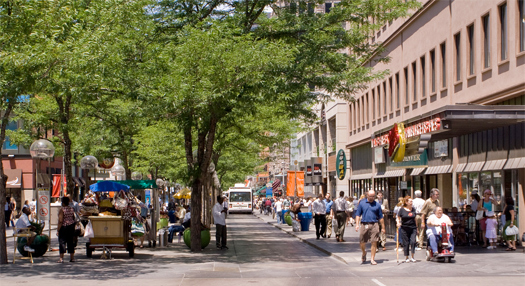David Brooks: Still Rooting for Auto Dependence and Sprawl
 David Brooks is dreaming of Denver, and in Denver they’re dreaming of transit-oriented, walkable neighborhoods. Photo of 16th Street Mall: ericrichardson/Flickr.
David Brooks is dreaming of Denver, and in Denver they’re dreaming of transit-oriented, walkable neighborhoods. Photo of 16th Street Mall: ericrichardson/Flickr.Looks like there’s at least one bubble that has yet to burst: David
Brooks’ unyielding enthusiasm for exurbs and car dependence. In today’s Times, the nation’s most famous sprawl apologist cites a recent Pew study to argue his case:
The first thing they found is that even in dark times, Americans are
still looking over the next horizon. Nearly half of those surveyed said
they would rather live in a different type of community from the one
they are living in at present.Second, Americans still want to
move outward. City dwellers are least happy with where they live, and
cities are one of the least popular places to live. Only 52 percent of
urbanites rate their communities “excellent” or “very good,” compared
with 68 percent of suburbanites and 71 percent of the people who live
in rural America.
That’s
a pretty thin reed to lean on, but Brooks tries to support a whole
schadenfreude-filled column with it, mocking efforts to curb sprawl and
give people better transportation choices:
The time has finally come, some writers are predicting, when Americans
will finally repent. They’ll move back to the urban core. They will
ride more bicycles, have smaller homes and tinier fridges and
rediscover the joys of dense community — and maybe even superior beer.America will, in short, finally begin to look a little more like Amsterdam.
Well, Amsterdam is a wonderful city, but Americans never seem to want
to live there. And even now, in this moment of chastening pain, they
don’t seem to want the Dutch option.
Where
to begin? Brooks draws conclusions that the Pew study just doesn’t
support. He gleefully notes the absence of older, Eastern metro areas
from Pew’s list of
the most desirable American cities, while neglecting to mention that
highly-ranked places like Denver, San Francisco, and Portland
are all taking significant steps to become more walkable, bikeable,
or transit-oriented — in other words, more urban.
Likewise,
he sees the relative dissatisfaction of city residents as a judgment
against urban form, but why not pin it on poor urban air quality, or
perceptions of public education, or unsafe city streets that concede
too much to the automobile? One could just as easily spin cherry-picked
Pew data to argue against the Brooks point of view:
-
Americans are all over the map in their views about their ideal
community type: 30% say they would most like to live in a small town,
25% in a suburb, 23% in a city and 21% in a rural area.
See,
most Americans would prefer to live in a city or small town. I could
say that they hunger for walkability and "dense community," but I won’t,
because the Pew study is not a useful barometer of American preferences
for urban form and transportation options.
Which won’t stop
Brooks and his ilk from advancing a favorite straw man argument at
every opportunity: that planners want to take away everyone’s cars and
force people to adopt a different lifestyle. As if tens of thousands of Portlanders have no choice but to commute by bike every morning. Or a shadowy cabal put a premium on house values near Denver light rail. Or jackbooted thugs marched Americans to polls at gunpoint last November and ordered them to vote for $75 billion worth of transit-related ballot initiatives.
The sprawl dead-enders can deride "planners" and scream "Amsterdam!" all they want. It’s easy to see why they protest so much: If they ever acknowledged the fact that ending car-dependency is about
giving people choices, it might lead to some self-incriminating conclusions about who’s trying to put restrictions on whom.





